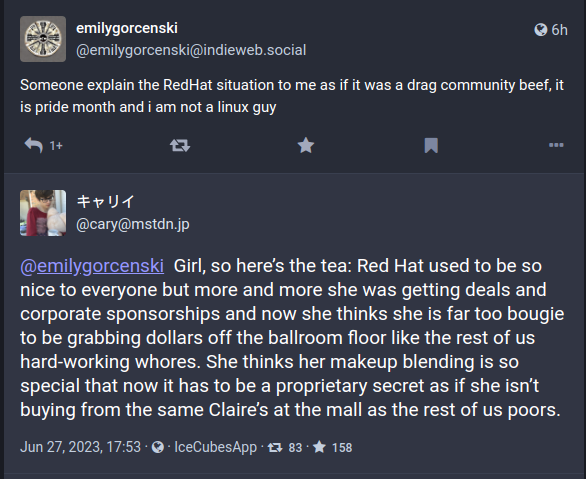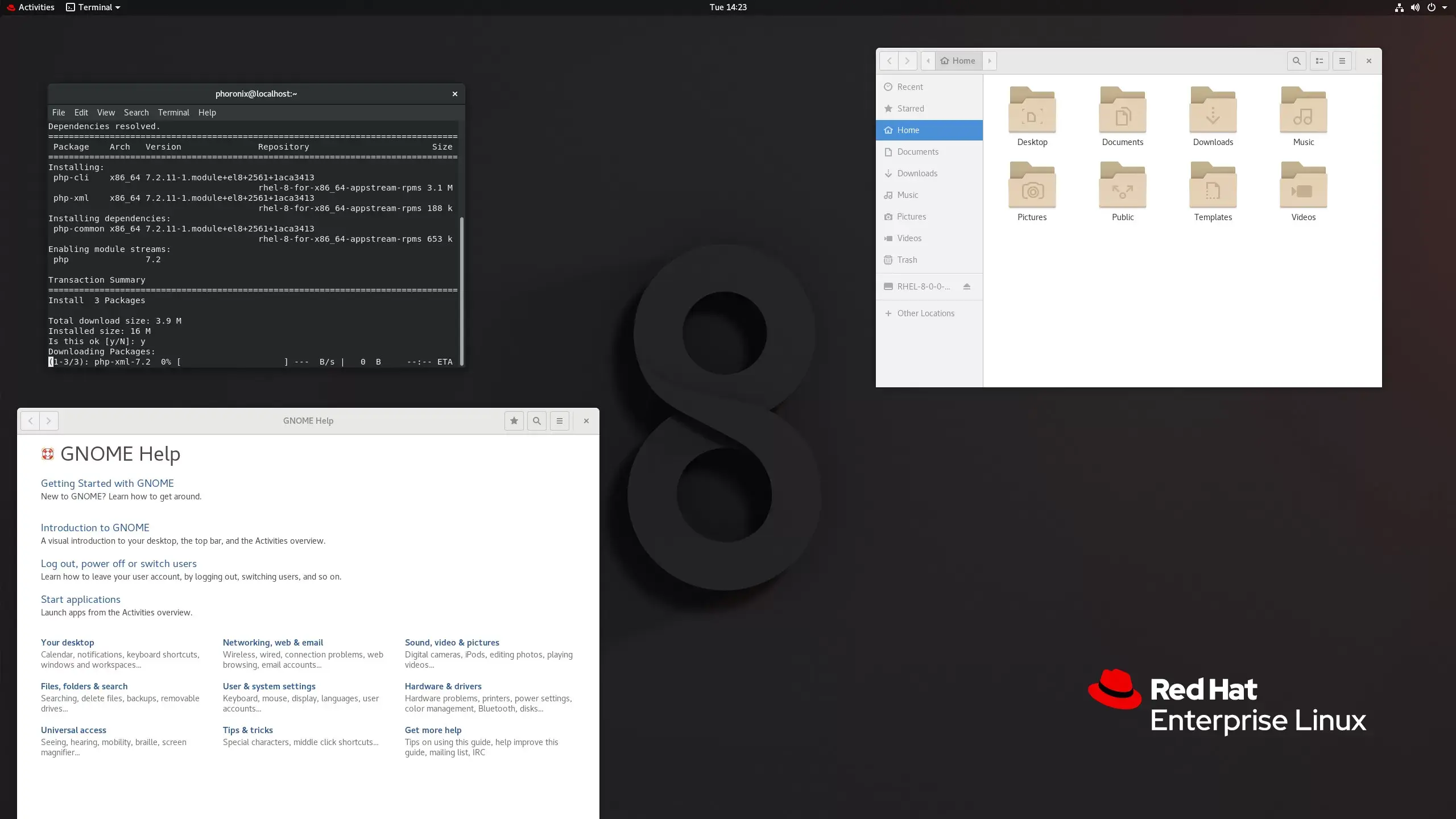… feel that much of the anger from our recent decision around the downstream sources comes from either those who do not want to pay for the time, effort and resources going into RHEL or those who want to repackage it for their own profit. This demand for RHEL code is disingenuous.
Then remove all open source code from your code base. I don’t mean some, I mean all. Let’s see whose code you’re repackaging for your own profit.
I can’t help but notice how similar their phrasing is to Spez trying to justify why Reddit has yanked the rug out from under their third party app developers.
It’s not surprising. A lot of these CEOs run around in cliques. They have forums, news letters, Chatrooms, and social events. When Silicon Valley Bank went down, the CEO of the company I work for was giving us news from other CEOs he was talking to from a shared Chatroom they set up, basically a discord for CEOs.
The other point is that many CEOs are slaves to trend and have a deep fear of missing out.
In a way, they’re organized, and combined with the above, that’s part of why when one big company hops everyone leaps behind them as if they’re moving as one (it’s all a dick-measuring Highschool clique contest though, which is why I don’t use the word conspiracy). I would not be surprised if Huffman and Musk both repeated their rhetoric to an adoring crowd of fellows before they took it to their feeds. It’s maybe why they speak so brazenly, because there is a little echo chamber of people who worship at the altar of Survivorship bias in the hope that heaven will send them more bigger-dick pills.
I’m not surprised, but that is the most pathetic thing I’ve ever heard.
It’s all language trying to justify their greed. I bet it happens all the time, it’s just that they built their empires out of everybody elses work. In trying to wall off their gardens, they’re having to justify to the public why their greed is ok. Biting the hand that feeds.
Spez actually tried to justify it?
I only saw him blaming “power-hungry” moderators for being “greedy”, and apollo “for profiting millions” from reddit’s api.
Blaming anybody for profiting off Reddit without Reddit gettinga cut, when Reddit is looking to profit off of user content, without giving the users a cut.
It’s the classic argument of “your reasonable concerns are detrimental to our business model”
I’m also disappointed in how so many people are just accepting their excuse when it’s incredibly obvious that it’s just a cash grab.
two things I wouldn’t have predicted for myself in 2023. I’m not longer using Reddit or RHEL (and I’m RedHat certified)
I think the solution is the same.
You made this? No. I made this. -Basically every capitalist.
lol you forget that everything already in their code base is “theirs” but anything new is also theirs. IBM dont care, they only answer to Wallstreet.
Yeah this is an insane take (on RH’s part). There’s not a viable product left if they remove the FOSS code.
don’t want to pay for the time, effort…
It’s Linux. If RH didn’t want to contribute to a FOSS project and take advantage of the other tools therein, they could have been coding their own OS from scratch all these years.
When I say we abide by the various open source licenses that apply to our code, I mean it.
So he’s saying that Red Hat intends to abide by licenses such as the GNU GPL, and yet…
Simply rebuilding code, without adding value or changing it in any way, represents a real threat to open source companies everywhere. This is a real threat to open source…
Red Hat is claiming that redistribution (which is explicitly allowed and encouraged by the GPL) is a threat to open source. They are also threatening to penalize customers who do exercise the rights granted to them by the licenses that Red Hat claims that they will “abide by”.
According to Red Hat the GNU GPL is a threat to open source. And they think this won’t make people angry?
deleted by creator
This is beginning to sound like they’re calling open source piracy.
No, they’re pointing to things in the past like what Amazon was doing to Elastic, MongoDB, Redis, and others where they (legaly) took the others companies code and made it available in a very simple way an AWS for free so that people would buy other services from AWS instead of paying Elastic and the others - who do do the development job - for hosting the databases. This destroyed their business model so they had to change their licenses from Open Source licenses to closed source licenses. So in this case Red Hat is in the same boat as Elastic and they are right that this is a threat to open source companies everywhere.
edit: Some more background info about this problem: https://techcrunch.com/2018/11/29/the-crusade-against-open-source-abuse/
Should be obvious, but I will point it out anyway… “Open source” is a higher priority than “open source companies”.
So, is this something they could have solved using a different licensing strategy? Seems like they should have seen this as a possibility before banking their business strategy off of it.
Normally you start a open source project to scratch your own itch and to share it with other enthusiasts. Only once you decide to make it a business it’s kind of difficult to keep it Open Source and to make money, therefor they make it closed source and everyone is mad like this time with Red Hat.
The thing is RH shouldn’t even claim ownership of RHEL. Their business is support. The more RHEL that’s out there, the more someone is likely to pay for a support incident.
The moment they started thinking they own a particular Linux package, even one they assembled, they became evil.
In fairness, IBM has been evil since long before they thought they owned RHEL.
part of the problem is that RHEL is so damn solid that most companies can use it without any support. that is why centOS was so popular
The GPL doesn’t “encourage” redistribution. It requires it.
If you’re distributing software, yes. I used “encouraged” there to include end users, who are encouraged to share software with others.
Currently RedHat is publishing the sources of the components together with the build scripts, in form of source RPMs. The build scripts mostly are property of RedHat - GPL conditions are fulfilled if they provide you with the sources and changes they made to the sources if you request them. They don’t have to provide build scripts, they don’t have to provide sources unless you request them.
The phrase “free software” (or “FOSS,” “libre,” or “FLOSS”) doesn’t appear once in this article.
That irritates me. We’re talking about the GPL, and the right to look at source code is only one of the freedoms that the GPL protects. The right to redistribute is also key.
Contributing back is besides the point. GPL is infectious, so all of their code which they aren’t releasing the source of is also considered GPL. So unless they release all of the source code they are still non compliant and I have to imagine they’re wel aware of this.
I think they’ll still be compliant as long as they offer their source to customers. The GPL doesn’t require that you make source available to anyone, but to anyone that you distribute binaries to. From the GNU website:
One of the fundamental requirements of the GPL is that when you distribute object code to users, you must also provide them with a way to get the source.
Source: Quick GPLv3 Guide under the More Ways for Developers to Provide Source section.
Of course the GPL also allows redistribution of source code, and Red Hat seems to want to threaten customers who do so.
Yeah, preventing your users from redistribution this is where they might get into trouble and the GPL license would be retracted and thus they would have pirated the software. But someone would need to prove it in court and IBM has a couple of good lawyers.
deleted by creator
They’re still sharing the source code.
What they’re doing is requiring companies to sign supplementary contracts that say “we’re not restricting your rights granted by the GPL but we will punish you if you exercise them”, which is pretty clearly not what open source is about.
Based on what I’ve seen, they’re limiting publicly accessible sources to CentOS Stream sources. Red Hat customers can still access RHEL sources throught the customer portal.
From here
Not quite–all developer accounts for RHEL will have access to source. They’re just trying to restrict redistribution of said source by downstreams.
the GNU GPL does not restrict what people do in software; it just stops them from restricting others.
Also this.
Which I imagine (though I’m not a lawyer) that cutting service agreements for redstribtion may violate. Even if a court wouldn’t see it as a violation, it certainly is in spirit.
Red Hat’s definitely viewing libre licenses as a threat to them, since it allows distributions like Oracle, Alma, and Rocky to continue to exist.
GPL only says you have to give the users the source code when they ask for it and you can make them pay for the distribution and they are already doing that so I’m not sure what you mean here.
I’m not a lawyer, and I certainly don’t know the license to that degree, but if true then it seems reasonable for them to stop freely distributing source code and I’m not sure what people are upset about… Sucks to lose something you used to get for free, but hardly an injustice.
Sounds like there’s nothing stopping these derivative distro’s from purchasing the source and continuing on.
Red Hat is saying if you buy a license and then redistribute the code, they will stop selling it to you.
This part is against the GPL, which specifically allows redistribution.
Man, trying to build a moat around Free Software requires a level of entitlement that is just mind-bending.
Related: Somebody on Mastodon asked to explain to them the RedHat situation as if it was a drag community beef , and as a screenshot for the lazy:

Yeah rip read hat. Thats a big no no in the Linux World…
From what i get,
It seems like they are pissed at oracle specifically,
Selling a oracle branded rhel clone with minor tweaks and a oracle certified sticker.And the other downstream distros are just collateral damage.
Obviously wouldn’t make it better
(But imo more understandable)The literal point of GPL is that Oracle is explicitly entitled to do exactly that. You don’t own the code.
We had this already with mongodb, Elastic search and AWS. It’s not sustainable to give away your work to your competitors so they can make the money.
Then just write proprietary code. Open source philosophy to me seems about creation for a “greater good”. What’s the point if you’re not even going to be open? The organisation just becomes a massive corporation like any other at that point.
I think you should read up on Open Source vs Free Software. Open Source has been invented by Enterprise companies as a development model which saves them money. That is why they invented licenses like MIT and BSD where you can take what the community did and make it closed source.
Free Software on the other side is more what you’re thinking about, a moral stance which is much older than Open Source and not created to make development easier and cheaper but to grant users freedoms.
Point still stands regardless of pedantry. RedHat would not exist at this scale without the ‘free software’ community, as you call it.
Ugh, fuck it. I’m transitioning my developers to straight-up Debian. I don’t need this shit.
Not surprising that RHEL is now trashing every FLOSS license it’s beholden to. They’ve violated the licenses and I genuinely someone over at GNU or something gets to goosing them with lawyers.
They’ve violated the licenses
Did they? Because as far as I know they’re complying with the GPL and other licenses, since everybody that gets their RHEL license (and the software/binaries) also gets the sources. Or am I mistaken?
I don’t think the license says ‘grant everybody a copy of your source code’, only the ones that actually bought access to the binaries RHEL provides
That’s fine, it’s the threats about terminating support agreements or dev accounts if you redistribute the source code that’s stepping really close or over the line. The license gives you the right (and in some cases the responsibility) to redistribute.
Yes. It seems like it would be illegal to make someone sign something that would be violated if you exercise the rights of the license.
Would they be able to make you sign something that says you are not going to ask for the source code?
Yeah, thats just it. I realize people are at the least annoyed, but this was always in the books. It wasn’t guaranteed they would go this way, but the page was there and they decided to finally flip to it. After the centos things, it was really a matter of time
You should have migrated from RH a long time. They aren’t with this breaking any licenses. Hurting souls and hearts, yes, but not licenses
To me everything seems to point to the fact that community developed distros, even if funded by corporations, seems to be the best option moving forward.
Well now, this could be Arch Linux’s moment to shine.
Yes, because I too would definitely use a rolling release disto on a production machine.
that was the joke!
Oh, whoops…
Prime example of Poe’s Law, I guess.
any downstream RHEL clones were only allowed to exist as long as Red Hat allowed them to. thinking back, after centos debacle, it was only a matter of time.
we’ve been migrating our infrastructure (nothing big, about 2000 VMs) to Debian for the last 9 months because it’s the only distro nobody can unilaterally take away from you. it was almost exclusively a centos shop before.
Ooh ooh, let me make some popcorn before I read this!
I stopped using rhel/centos after 7 personally, the rolling update seems weird. I’m fine with the AWX model of being the beta testers for the paid product. It is a little different for an OS though as AWX has many features that sometimes are randomly broken on each “release”, but at least there are defined releases. I’m sort of giving up on Redhat, it’s wildly expensive, they have good products but not worth the costs they sell at and I’m tired of trying to constantly navigate this song and dance.
We had rhel at university and I just really couldn’t get warm with it. By that time I’ve used SuSE, Debian and Gentoo at home but somehow it was just to weird :D. On the other side I have no problems with Fedora, so I guess it was just in my head.






















